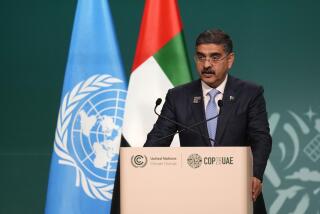Pakistan says it shot down India’s warplanes and warns mistakes could lead to war

Pakistan’s prime minister calls for talks with India after warplanes reportedly shot down.
- Share via
Reporting from ISLAMABAD, Pakistan — Pakistani Prime Minister Imran Khan called for talks with India and warned of miscalculations that could lead to war in a national television address Wednesday, hours after his nation’s air force claimed to have shot down two Indian warplanes and captured a pilot.
The overture came amid two days of flaring tensions between the nuclear-armed nations that started Tuesday when the Indian air force made what was believed to be its first incursion over Pakistani territory in decades to bomb a militant training camp. India said the camp belonged to a terrorist group responsible for killing 40 Indian paramilitary troops in the disputed Kashmir region two weeks ago.
After promising to retaliate for the incursion, Pakistan said it downed two Indian military planes that crossed the so-called Line of Control, the de facto border in Kashmir, into Pakistani airspace Wednesday. One of the aircraft fell into Indian-controlled territory while the other crashed on the Pakistani side, where the pilot was captured. Purported video of the airman — bloodied, blindfolded and with his hands tied behind his back — has been shared online. Pakistan identified him as Wing Cmdr. Abhi Nandan; Indian news media gave his name as Abhinandan Varthaman.
“We waited and today we took action,” Khan said in a short address. “It was our plan to not cause any collateral damage and not to cause any casualties. We simply wanted to show our capability.”
India disputed Pakistan’s account of the confrontation. Indian Foreign Secretary Vijay Gokhale said Pakistan instigated the clash when its air force attacked Indian military installations. He said the strike was foiled and a Pakistani military plane was shot down over its own territory. Gokhale said India lost one warplane in the exchange and declared the pilot missing in action.
“Pakistan has claimed that he is in their custody,” Gokhale said in a news conference. “We are ascertaining the facts.”
In a separate account, prominent Indian defense analyst Ajai Shukla said in a tweet that two Indian air force jets were shot down by ground fire after they were lured toward the air defenses by Pakistani planes returning home from a bombing run.
India’s foreign ministry released a statement after Khan’s speech describing Pakistan’s attacks Wednesday as an “unprovoked act of aggression.” The ministry also objected to the way images of the captured pilot were being disseminated.
“India reserves the right to take firm and decisive action to protect its national security, sovereignty and territorial integrity against any act of aggression or cross-border terrorism,” the statement said.
The ministry made no mention of earlier remarks by Khan, who implored India to help de-escalate the situation between the historical enemies.
“I ask India: With the weapons you have and the weapons we have, can we really afford a miscalculation?” he said.
“If this escalates,” he added, “it will no longer be in my control” or that of Indian Prime Minister Narendra Modi.
Khan closed his speech by saying, “Let’s sit together and settle this with talks.”
Accepting the overture will be anything but easy for Modi, who is banking on support from Hindu nationalists in upcoming general elections this spring.
“The last thing the Indian government would want, just weeks before an election and so soon after an attack that killed more than 40 Indian security personnel, is to be perceived as going soft on Pakistan and caving in to a Pakistani request for de-escalation,” said Michael Kugelman, a South Asia expert with the Wilson Center.
But Jonah Blank, a senior political scientist at the Rand Corp., said Modi was far enough ahead in the polls to absorb any political blowback from accepting Pakistan’s olive branch.
“The Pakistani military needed a face-saving way out,” Blank said. “They could not simply do nothing. They managed to create a way out for themselves. They not only shot down an Indian [warplane], but they captured a pilot. And that will let them, if they choose, portray this as a victory.”
The airstrike Tuesday was seen as a move to answer growing calls in India to punish Pakistan for not doing enough to stop Jaish-e-Mohammed — the terrorist group responsible for the suicide attack on Indian security personnel Feb. 14 in Pulwama, a district in Kashmir.
Khan said in his speech Pakistan had asked India for “actionable evidence” about the terrorist group and said it wasn’t in his country’s interest to harbor militants.
That contradicted what Gokhale said Tuesday about India repeatedly providing Pakistan with information about the location of Jaish-e-Mohammed’s camp, adding that Pakistani officials continued to deny its existence.
“The existence of such massive training facilities capable of training hundreds of jihadis could not have functioned without the knowledge of Pakistan authorities,” Gokhale said.
Experts said the international community needs to step in to help India and Pakistan reduce tensions.
“It is possible this may not lead to conflict. But the possibility of a further escalation does exist, and that is precisely why the U.S. and other countries need to step up with more active diplomacy to help de-escalate,” said Alyssa Ayers, an expert on South Asia at the Council on Foreign Relations. “Given the stakes, I hope we never have to contemplate open conflict.”
Times staff writer Pierson reported from Singapore and special correspondent Sahi from Islamabad.
More to Read
Sign up for Essential California
The most important California stories and recommendations in your inbox every morning.
You may occasionally receive promotional content from the Los Angeles Times.











